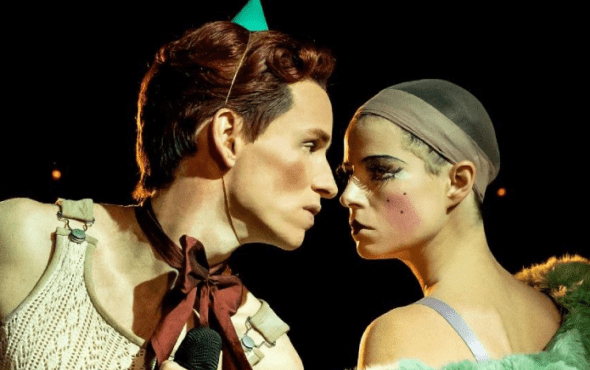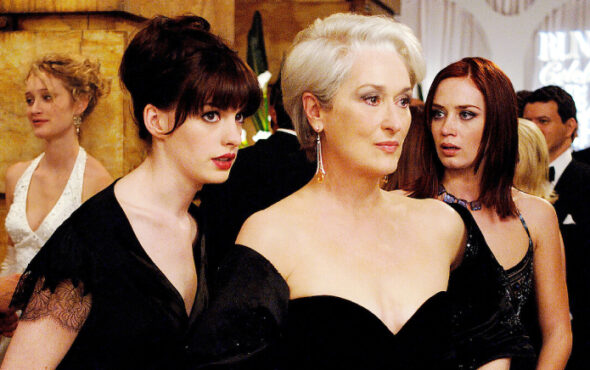
London’s Playhouse Theatre is spectacularly transformed into the seedy KitKat Club for an incredible escapist production.
Plastered across the London scene, posters of John Kander and Fred Ebb’s 1966 musical revival were a big hit. Gothic-inspired images of the cast appeared across the city backdrop, teasing a hedonistic theatre world where stalls and stands become an immersive Weimar-era cabaret setting.
Red light bathed the corridors and Cabaret stars lurked around the reformed stage as the audience piled into the pop-up KitKat Club. Expectations around the adaption of the legacy musical were set. The auditorium was cleverly redesigned with circular tables and accompanying chairs that imitate the closeness of a conventional cabaret layout. Soon enough, Eddie Redmayne, cast as the club’s impish Emcee, enters. Contorting his narrow frame, hunched forward, the star enters offering the audience an over-enthused “Wilkommen”. A headlining name for the production, the actor effortlessly absorbs his role. Onward, Redmayne looms throughout, serving as an on-looker, at times, clambered upon the upper dress circle beams. Clasped in a conical red party hat, his forward bearing figure shares an uneasy optimism, matched by his well-sculpted German accent.
As the musical progresses, the actor efficaciously mirrors the play’s gradual darkening theme. Scuttling across the stage, Redmayne shifts from a charmingly louche figurehead to, later, a genderless image of death erupting from the stage floor. Here -and time again- Tom Scutt’s brilliant stage design adds a new dimension to the production. A deathly foreshadowing as we, once again, are reminded of the Nazi politics encroaching on everyday German lives. As the character introductions continue, the cabaret club soon catches glimpse of the famed Salley Bowles (Jessie Buckley). A pronounced leading act, Bowles dreams of stardom. Diverging from the traditional character template, Buckley is confident and overcompensatingly comical. Often decked out in her signature fur coat, the character is brought to life with astonishing renditions that were met with loud applause. Notably, Buckley’s performance of Maybe This Time and Cabaret are incredible.
Scene sharer Omari Douglas (Cliff Bradshaw) neatly compliments Buckley’s eccentricity. The actor’s cool vocals and performance are reliable assets to the show. Douglas cleanly steps into the anxiety and curiosity of his bisexual American author role, however, his well-grounded performance struggles to peak past an early shared kiss with another man. Elsewhere, the subplot romance between Fraulein Schneider (Liza Sadovy) and Jewish grocer (Herr Schultz) is both heartwarming but knowingly doomed. The endearing charm between the two outshines Buckley and Douglas’ chemistry. Sadovy and Schultz spend much of the production in a delightful back and forth which is shattered as antisemitic themes creep through the adaptation.
One of Cabaret’s most striking moments revolves around Cliff’s personable friend Ernst Ludwig (Stewart Clarke) who reveals a swastika armband while taking off his coat. Met with audible crowd gasps, the set-up receives its fighting intended effect. This explicit direction is preserved and only replayed once again in the shorter second half as Redmayne returns to stage. As audiences settle down, the star washes away any presumptions with an absurdist performance of If You Could See Her; a bizarre love song dedicated to a gorilla. As viewers try to track its direction, the audience is confronted with a cutting antisemitic line barked by Redmayne. It’s a chilling moment and rightfully so.
Throughout, Kit Kat Club’s dancers remain consistently fascinating. From their early scenes of vulgarity (masturbating to a copy of Mein Kampf) to their background appeal, the cast is a joyously diverse mix of comedic and playfulness. It’s a reminder of the show’s commitment to a brilliant contemporary parable.
While Cabaret may be sold on Redmayne and Buckley’s leading names, it’s a modern reimaging that spotlights stars throughout its production. Taking to the London stage for the first time in almost a decade, it does not disappoint.
GAY TIMES gives Cabaret– 5/5



